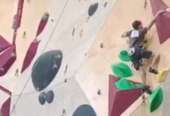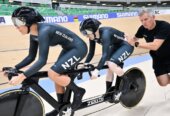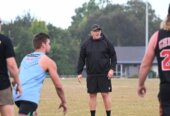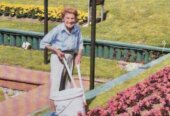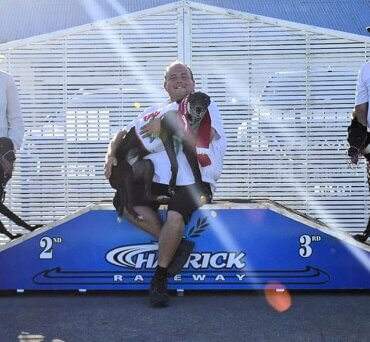
Corey Steele on the winning dias
This story was subject of a critical finding by the New Zealand Media Council which can be read here:
29 May 2025
When Te Awamutu-based greyhound trainer Corey Steele heard racing minister Winston Peters’ December announcement outlawing the sport in New Zealand, he was shocked.

Corey Steele and Opawa Sooty at home.
The sport is being phased out across 20 months to allow time to rehome the estimated 2900 racing greyhounds nationwide.
The last official racing event could be in July 2026 or sooner.
After meetings with Greyhound Racing New Zealand, the Government appointed Ministerial Advisory Committee (MAC) concluded rehoming the total dog population by July 2026 was not possible, and that there would need to be a rehoming effort of 24-30 months post closure.
Details of this are still to come.
Peters said the decision was driven by protecting the welfare of racing dogs.
At the time he said “despite significant progress made by the greyhound racing industry in recent years, the percentage of dogs being injured remains persistently high and the time has come to make a call in the best interest of the animals”.
Greyhound racing is in Steele’s blood and has been the family industry for several generations.
“My great grandfather Jim Steele won the Waterloo Cup back in the 1920s or 1930s, when it was still in the coursing days, but I’m a third-generation trainer,” Steele said.
The Waikato Greyhound Racing vice president trains his dogs on dad Wayne and mum Tracey’s property, Te Māwhai Racing Kennels.

BJ (Boston Junior) at 3 months old. He’s now 16 months, and his career cut short with impending ban.
“The welfare of the dogs means everything to me. What’s been hard mentally is being told about our lack of welfare,” Steele said.
“I love my dogs like they’re my children. It’s hard.
“The health of the dog is the most important thing. One, they can’t perform if they’re not healthy, and two, we’re the most transparent sport that involves animals in the world.
“If there’s any injury on the track, it can be so minor as a chip in a toenail, that dog can’t race for seven days because it’ll take that long to grow back.
“Every single greyhound has been checked by a professional veterinarian prior to going into the kennel block, prior to going on the track.”
Steele said that as well as the government, the trainers have the owners, Greyhound Racing New Zealand, the Racing Integrity Board and MPI to answer to.
“We’ve been answering to them so much over the last four years, that the announcement was definitely a shock. It changed my life in the space of about half an hour,” he said.
“We’ve exceeded all expectations and it’s still not good enough.
There had been egular reviews the industry had ticked the boxes, he said.
“With dogs being a man’s best friend, it draws on the heart strings of every New Zealander. So, it’s a very easy thing for people to have an opinion without knowing the facts.”
Steele said they heard nothing from Peters personally in the lead up to the announcement – or ever.
He had been working alongside the board of Greyhound Racing New Zealand for two years as an emerging director.
“My aim was to become a director on our board because I love the sport so much. I want collaborative success for everyone within the sport and I love the dogs. I want nothing but the best for everyone’s dogs,” Steele said.
“Winston never spoke to us from the day he got in as racing minister to the day of the announcement. We did not have one bit of correspondence with Winston himself.”
Since his parents gave him the opportunity to forge his own pathway in the industry, Steele has gone all in. Now his working future is uncertain.
“Mum and Dad have spent 30 years doing that, setting up this property to be the best greyhound facility that they can have, and it’s all wasted now,” he said.
“All the kennels that we’ve built, that we’ve spent nearly $100,000 on, gone – they’re worth nothing. The sheds, the irrigation system for our running track, our paddocks, it’s all for nothing now.
“On Christmas Day, we still go out and work. When we’re sick, back when we all had Covid, we were out there basically crawling in the kennels to make sure the dogs had the utmost care. Nothing like that has ever changed. The dogs come first; they always have.
“They’re talking about the welfare of the dogs, but very quickly they’ve forgotten about the welfare of the human.”

Corey Steele on the winning dias at Whanganui. Photo: Stevie Kite




